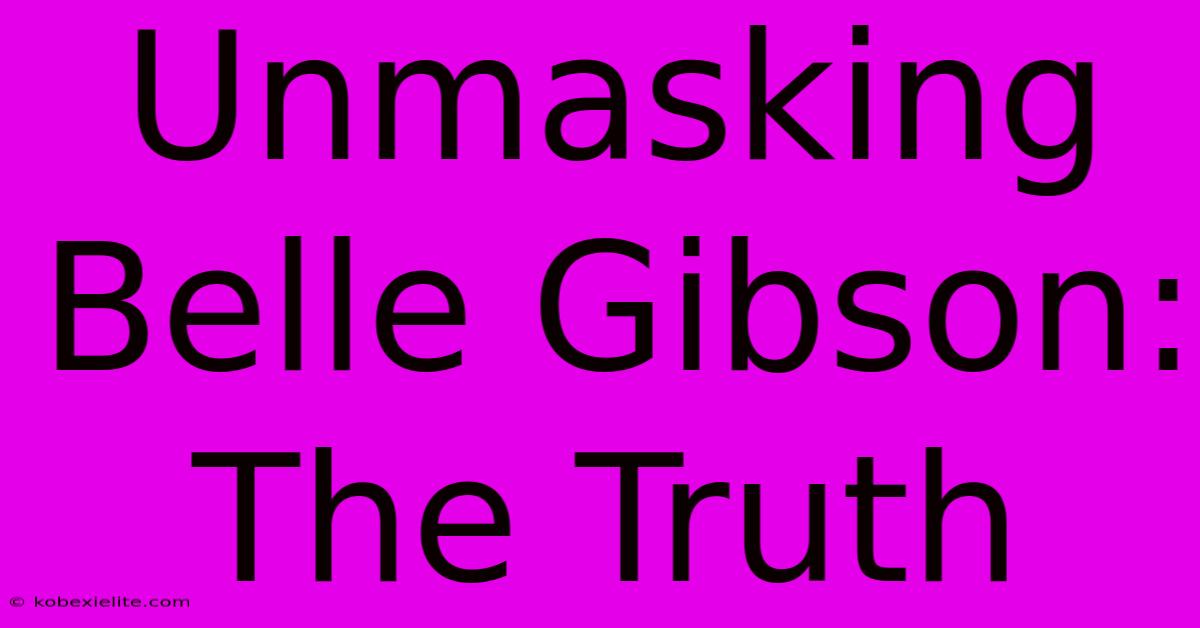Unmasking Belle Gibson: The Truth

Discover more detailed and exciting information on our website. Click the link below to start your adventure: Visit Best Website mr.cleine.com. Don't miss out!
Table of Contents
Unmasking Belle Gibson: The Truth Behind the Wellness Empire Built on Lies
Belle Gibson. The name once conjured images of a vibrant, healthy young woman who beat brain cancer through holistic living. Her app, "The Whole Pantry," and social media presence painted a picture of a wellness guru, inspiring millions with her seemingly miraculous story. But the truth, when it finally emerged, was far more sinister – a carefully constructed fabrication built on lies, deception, and the exploitation of vulnerable individuals. This article delves into the shocking reality of Belle Gibson's fraudulent empire.
The Rise and Fall of a Wellness Influencer
Gibson's rise was meteoric. Her story, initially shared on social media, captivated audiences. She claimed to have been diagnosed with terminal brain cancer at 19, rejecting conventional medicine in favor of alternative therapies. This narrative, coupled with her charming personality and seemingly authentic struggles, quickly turned her into a wellness icon. Her app, "The Whole Pantry," became incredibly popular, promising a path to health and happiness through natural remedies. She secured lucrative book deals, endorsements, and even hinted at charitable donations, all bolstering her image as a compassionate and successful entrepreneur.
The Cracks in the Facade
However, even early on, some inconsistencies emerged. Claims regarding her diagnosis and treatment were vague and often contradictory. Yet, her massive following seemed to overlook these inconsistencies, captivated by her compelling narrative. The public’s desire for a simple, natural solution to health problems, particularly cancer, made Gibson's message incredibly resonant.
The Revelation: A House of Cards Collapses
The truth unraveled slowly, starting with investigations by Australian media outlets. These investigations revealed that Gibson had never had cancer, nor had she donated any of the promised proceeds to charity. The "Whole Pantry" app, marketed as a source of healthy recipes and wellness advice, contained numerous inaccuracies and lacked the credibility it claimed. Her story, the foundation of her entire empire, was a meticulously constructed lie.
The Consequences of Deception
The fallout was swift and severe. Gibson faced legal action from consumer advocacy groups and individuals who felt betrayed. She was fined a substantial amount for misleading consumers and making false claims about her cancer diagnosis and charitable donations. The legal battles highlighted the far-reaching consequences of her actions and underscored the need for accountability in the wellness industry.
The Lasting Impact: Lessons Learned
The Belle Gibson saga serves as a cautionary tale. It exposed the vulnerabilities inherent in the ever-growing wellness industry and the power of social media in shaping public perception. The ease with which Gibson was able to build a multi-million dollar empire on lies highlights the importance of critical thinking, fact-checking, and skepticism when encountering seemingly miraculous health claims.
Beyond the Individual: Systemic Issues
Gibson’s deception wasn't solely a personal failing; it also highlighted broader issues within the wellness industry. The lack of regulation and the prevalence of unsubstantiated claims create an environment ripe for exploitation. This incident spurred increased scrutiny and calls for stricter regulations to protect consumers from similar deceptive practices.
Conclusion: The Importance of Critical Thinking in the Age of Information
The Belle Gibson story is more than just a tale of fraud; it's a stark reminder of the importance of critical thinking in the digital age. We must be vigilant in evaluating information we encounter online, particularly when it relates to health and well-being. Gibson's actions serve as a crucial lesson, reminding us to question narratives, demand evidence, and seek verified information from credible sources before accepting claims at face value. The unmasking of Belle Gibson reveals not only the shocking truth behind a fabricated wellness empire but also underscores the critical need for responsible information consumption in our interconnected world. The legacy of this case should be a renewed commitment to critical thinking and a call for greater transparency and accountability in the wellness industry.

Thank you for visiting our website wich cover about Unmasking Belle Gibson: The Truth. We hope the information provided has been useful to you. Feel free to contact us if you have any questions or need further assistance. See you next time and dont miss to bookmark.
Featured Posts
-
Short Handed Goal Propels Canadiens
Feb 06, 2025
-
Trumps Gaza Plan Arab Rejection
Feb 06, 2025
-
Coventry Vs Leeds Live Game Updates
Feb 06, 2025
-
Pettersson Shines The Stanchies Report
Feb 06, 2025
-
Mavericks Vs 76ers Betting Odds
Feb 06, 2025
